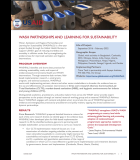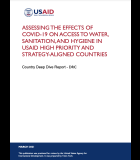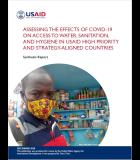Communication for Change (C-Change)
USAID funded C-Change to improve the effectiveness and sustainability of social and behavior change communication (SBCC) across development sectors.
C-Change was implemented the achieve the following objectives:
- Scale up best practices in SBCC
- Strengthen capacity in SBCC
- Generate and disseminate knowledge about SBCC
- Integrate SBCC within wider development agendas
C-Change incorporated knowledge about the social determinants and underlying causes of individual behaviors and took into account research and lessons learned from implementing and evaluating activities. It also employed innovative and tested methods to meet the continuing challenges posed by evolving health issues that require an SBCC approach; and worked to strengthen the capacity of local and regional organizations to plan, implement, and manage programs, thus ensuring sustained local knowledge and skills. C-Change worked with global, regional, and local partners in the major health areas, including family planning and reproductive health, HIV prevention, malaria prevention and control, and water, sanitation, and hygiene. C-Change also provided communication support to other sectors, including democracy and governance, civil society, and environment.
Activity Description
C-Change provided technical assistance and support for a broad range of USAID communication and capacity building activities in the DRC:
- Led efforts to reposition family planning and reproductive health (FP/RH) as a priority, developing and supporting radio dramas to increase use of FP/RH services, and developing a dialogue guide for community health workers as they conduct conversations about FP/RH.
- Engaged at national, provincial, and community levels on communication for malaria prevention and control, providing expert guidance and building skills and capacity in social and behavior change communication (SBCC).
- Developed and tested a comprehensive approach to reducing school-related gender-based violence among students ages 10–14 in Katanga Province, including by engaging teachers, school administrators, and community members
- Continued to build the SBCC capacity of partners who deliver services in FP/RH, maternal and child health, malaria, and TB.
- Built the SBCC capacity of local staff at Search for Common Ground and assisted them with incorporating behavior change messages around HIV prevention into several local radio and television programs.
Expected Outcomes
- Evidence-based scaled-up health and development communication programs implemented and best practices of behavior change applied, using state-of-the-art communication practices as well as participatory and community-led programming
- Health and development communication skills and knowledge transferred to developing country institutions in both the public and private sectors focusing on institutional capacity to plan, implement and evaluate comprehensive health and development communication programs
- Health and development communication integrated within the wider public health and development agendas
- Effective social and behavior change communication knowledge generated and shared to address emerging health and development issues by providing technical leadership, strengthening global learning and establishing an innovative knowledge agenda for health and development communication.
Actual Outcomes
- 3,627 people and 287 local organizations trained in SBCC.
- 415 SBCC materials developed for use in national or sub-national programs.





